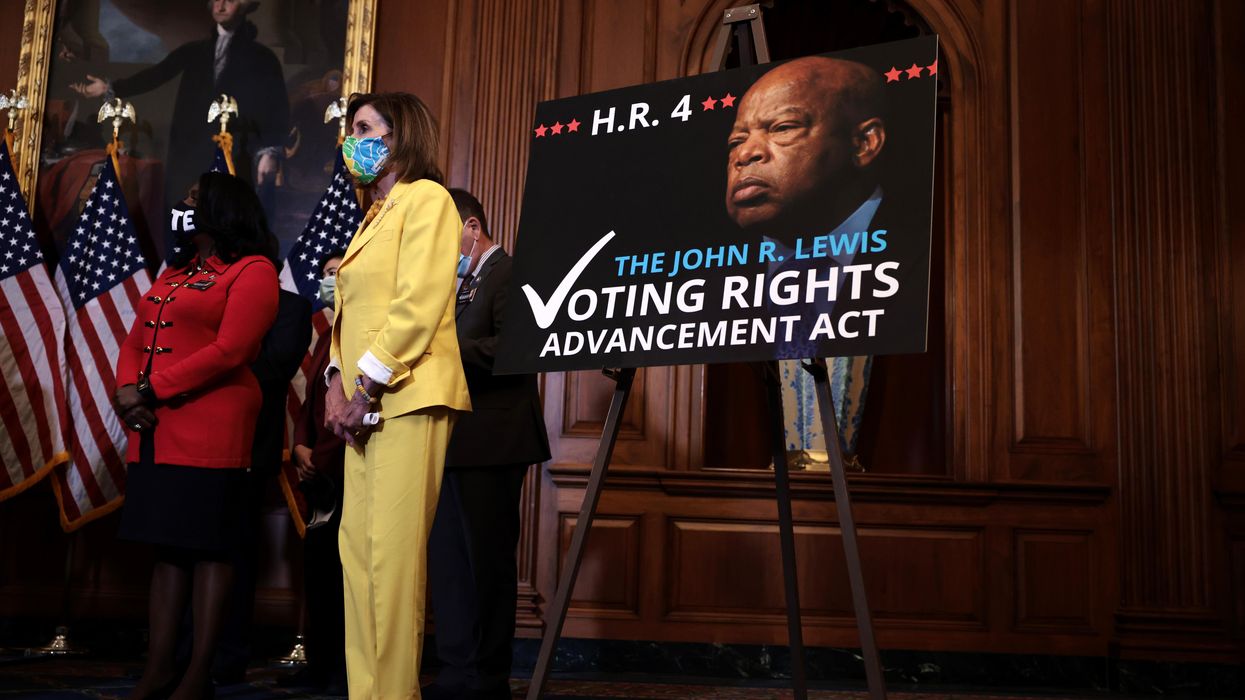Author and policy expert Robert Kagan drew broad notice with his Washington Post essay declaring that the nation is "already in a constitutional crisis" and may be on the cusp of "mass violence," but he is hardly the first to forecast democracy's demise.
Headlines like "Will 2024 Be the Year American Democracy Dies?" and books with titles like "How Democracies Die" and "Twilight of Democracy" have become commonplace in the post-Trump era.
The apocalyptic tone of much democracy writing is unsurprising given the magnitude of the crises facing the nation and world. But there is a danger that bleak alarmism can itself corrode democracy still further. The "genre of disaster prediction," as newsletter writer Robert Hubbell dubbed it in his response to Kagan, tends to stoke paralysis and despair.
This very demoralization is toxic to democracy. When the Economist Intelligence Unit first downgraded the United States from a "full" to a "flawed" democracy in 2017, it was because public trust in political institutions had tanked. "Popular confidence in government and political parties is a vital component of the concept of democracy" embodied by the index, the report noted.
When journalists, thought leaders and even democracy advocates harp exclusively on the ways government and institutions have failed, citizens lose faith. And without at least some faith in the system, Americans drop out. If all is lost in any case, why vote, speak up, follow the news, or engage in community and civic life?
That's why democracy advocates must go beyond prophesying doom and do the hard work of envisioning, and championing, a path forward. It's not that dire warnings aren't called for, or threats not real. It's that raising the alarm is not enough. Indeed, relentless doomsaying risks obscuring the opportunities that can arise from moments of disruption.
This column, The Civic Voice, will spotlight civic solutions and success stories as an antidote to 'round-the-clock bad news. As solutions-focused sites like the Solutions Journalism Network, the Good News Network and the new online magazine Reasons to Be Cheerful attest, Americans are thirsty for a bit of hope.
The value of good news goes beyond spreading cheer. Publishing a story about what's working "is the ultimate form of holding power to account," said Reasons to Be Cheerful co-editor Christine McLaren in an interview. That's because "it's giving people a story to point to and say, 'Look! It doesn't need to be this way! There are people doing it differently and here's how.'"
Spreading good news may sound "corny," acknowledged journalist Roxanne Patel Shepelavy, writing about "Where to Find Hope" in The Philadelphia Citizen. But hope is more important than ever, "because we can't heal what ails us if we don't think a cure exists."
So where can democracy advocates find hope? Here are a few signs that American democracy, while buffeted on many fronts, has as much (if not more) potential to revive and thrive as to collapse with a whimper.
Voting Rights. The unprecedented state-level assault on voting rights since the 2020 election, stoked by Donald Trump's "Big Lie," constitutes perhaps the most direct threat to American democracy today.
Yet on the good-news front, Arizona Republicans' highly criticized 2020 vote audit reaffirmed that "truth is truth,"and gave President Biden an even bigger win. And the John R. Lewis Voting Rights Advancement Act, which would restore key Voting Rights Act protections, is winning serious attention on Capitol Hill.
A surprising number of states, moreover, are making it easier to vote, not harder. While 19 states have enacted 33 laws that limit voting since the 2020 election, according to the Brennan Center for Justice at New York University, the number of laws that expanded voter access is actually far larger, totaling 62 in 25 states.
These laws to facilitate voting, with measures like expanded early nd mail-in voting, "do not balance the scales," the Brennan Center asserts. But according to The Washington Post's Perry Bacon Jr., the voting rights expansion is one of several "groundbreaking initiatives" in blue states, from "Baby Bonds" in Connecticut to greenhouse gas cuts in Oregon, that offer "a vision for a better America."
Constitutional Reforms. On Capitol Hill, as breathless reports remind us daily, partisan and intraparty disputes have stalled infrastructure legislation and placed the nation at risk of default. But such congressional stalemates themselves may usher in important constitutional changes, argued John F. Kowal and Wilfred U. Codrington III recently in Politico.
Constitutional amendments tend to come in waves and "typically have followed periods of deep division and gridlock like ours," wrote Kowal and Codrington, who authored a book on the topic. "In fact, history suggests that periods of extreme political polarization, when the normal channels of legal change are blocked off due to partisan gridlock and regional divides, can usher in periods of constitutional reform to get the political system functioning again."
People Power. Election law expert Richard Hasen's law review article warning that partisans in state legislatures, election offices and even the Supreme Court may usurp voters' choices in 2024 was plenty sobering.
But Hasen's article also emphasized that voters have a way of having the last word. He noted that public pushback helped defeat some of the worst elements of recent state-level voting restrictions, and that organizing and political action "will be needed to reinforce rule-of-law norms in elections." He also suggested "preparing for mass, peaceful protests in the event of attempts to subvert fair election outcomes."
Hasen's article prompted yet another flurry of articles on democracy's possible collapse. But Hasen's analysis spoke not just of gloom, but also hope. Democracy will be stronger if the hopeful side of the story gets out as well.




















Trump & Hegseth gave Mark Kelly a huge 2028 gift